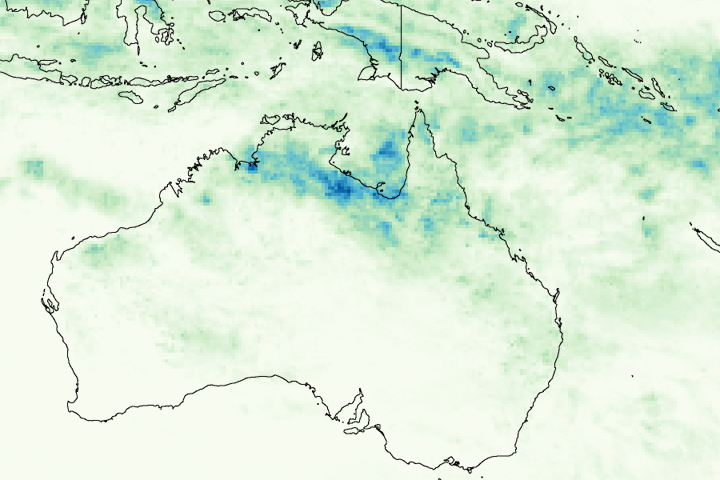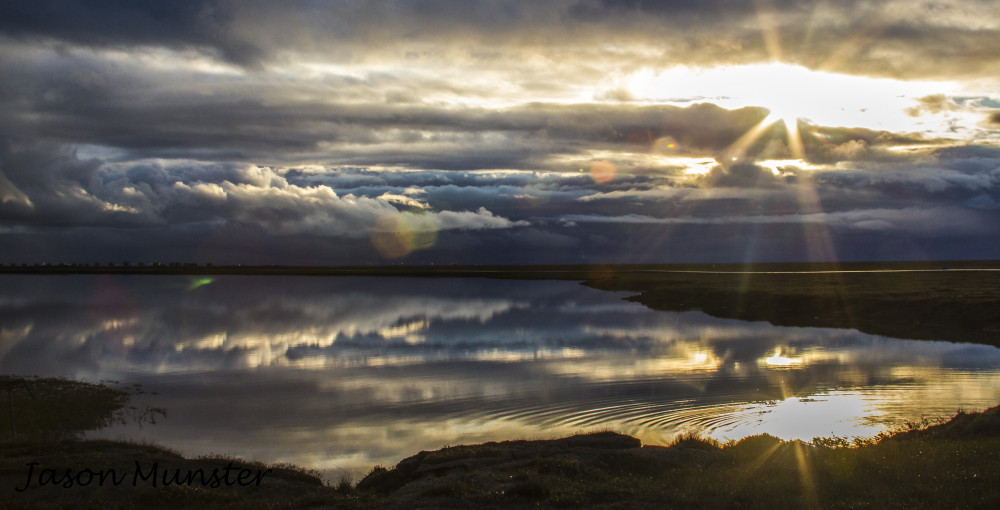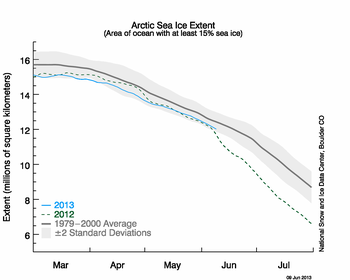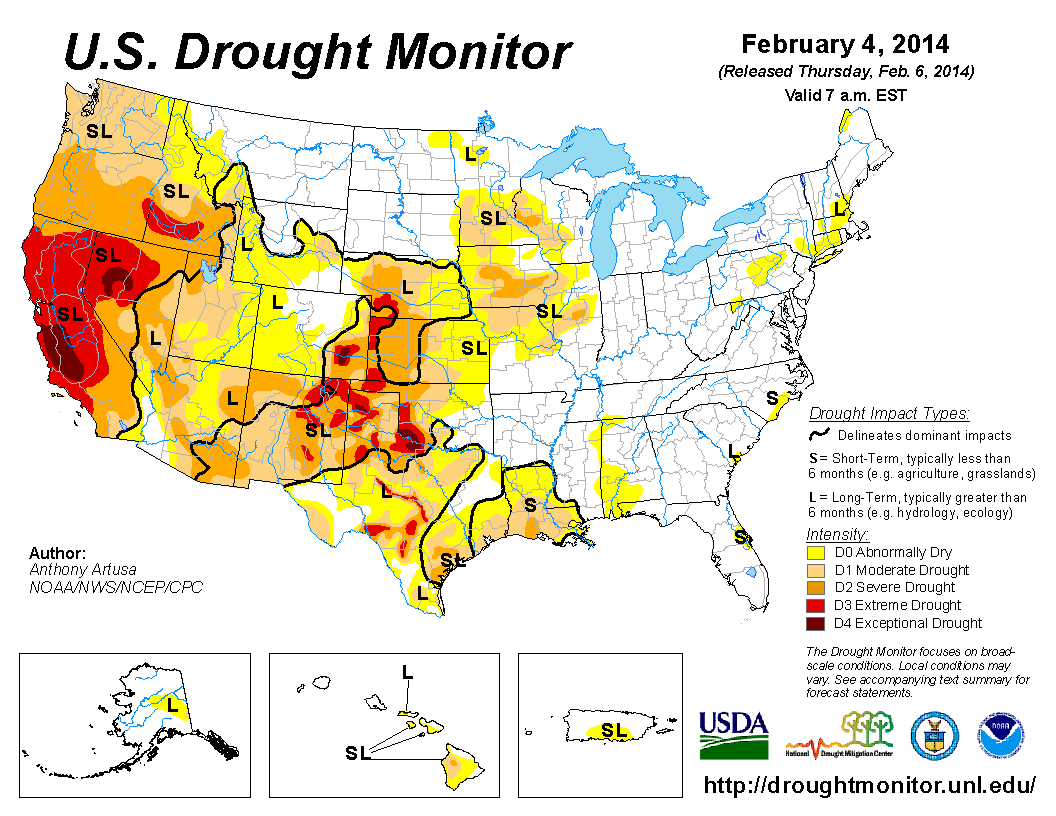I am not expert on different effects of climate change. But I do know a good smattering of random things. More importantly, several of my coworkers in grad school are at the forefront of the research of a lot of things here.
Here are some events relating to climate change, with indications of how much I think I know about it. So, for these things, I will have a title, than a 5 star rating for my level of confidence in the material I am presenting. 5/5 means I think I know a whole lot, 4/5 means I know what a grad student in a related field should know, and I probably am friends with one of the experts in the field, 3/5 means I am conversant in it, 2/5 means I understand it a little and have seen the math, 1/5 means I have heard of it and think it is worth mentioning. It is important to note that anything rated 1 or 2 should be taken with a grain of salt, and should absolutely not be cited. I don't really know much about these things, other than they are possible.
Melting Ice Sheets - 3/5
It seems like every summer, the news programs get all abuzz over the Arctic ice extent. No matter which way it goes, they get excited. The extent is literally the surface area that this ice covers. But as we discussed on an early post about thermodynamics, the amount of heat energy you have to pump into a system does not relate to its surface area, but instead to its volume, since volume is directly related to mass. And the story of ice volume yearly minimum is more telling: the minimum ice volume in the summer has decreased by a factor of nearly 50% over the past 5 years. In other words, half of the summer ice is gone.

The areal extent of ice seems somewhat erratic. The volume measurement of arctic ice over the last 5 years is a much more important measurement
What happens when the ice goes away?
Albedo changes - everyone knows about this, so I won't rate my knowledge here. In the last post, I mentioned that ice reflects 90% of light energy, and water absorbs 90%. If the sea ice disappears, more heat can be absorbed and trapped by the Earth, causing warming to happen more quickly.

Shortwave radiation is high-energy radiation from the sun. Longwave is infrared that comes off from Earth. Ice reflects shortwave (sun) radiation.
Stronger temperature changes in high latitudes
As the planet warms, the warming will be more felt in the high latitudes (ie the Arctic and Antarctic). As you can guess, this will have feedbacks with the ice melting and albedo changes.

Projected temperature increases show that the high latitudes will have far more profound temperature increases under climate change.
The habitats of the Arctic will present another positive feedback - 5/5
This is what I study directly. I don't model this, I measure it. Well, my team does. I am a small part of that. In normal biomes, plants pull CO2 from the atmosphere and turn it into plant matter. A lot of this is leaves or grass and such. They then die, fall to the ground, and get consumed by bacteria or oxidized to become CO2 again. So most of the CO2 consumed by plants and such is recycled back into the atmosphere.
In cold places, it is different. Moss and grass grow in the summer (no trees, permafrost prevents them from ever taking root). Much of this after it dies does not get recycled to CO2 again,cause the freeze already happened and it is too cold for the stuff to become CO2. This has happened in the Arctic for 300,000 years or more. In the first 3 meters of Arctic soil, there is enough undigested carbon to double the amount of CO2 in the atmosphere. Obviously it won't all release at once, and most of it may not release. But even if a part of a percent started being released per year, it would match mankind's CO2 emissions. This hasn't started happening yet, but if it did, we'd want to work fast to reverse it if we hope to prevent climate change from jumping into a strong positive feedback loop that we cannot control.
More on this later, when I describe my actual research and what I do day to day.
Weather patterns change - 1/5
I can barely even hand-wave at this one. The ocean strongly influences atmospheric circulation patterns. Hurricanes, for instance, always form over the ocean. This is because the ocean has a ton of thermal momentum (it doesn't change temperature at the same rate as the atmosphere) and the top layer of it is well-mixed, so even if the top few inches warm up, it will rapidly be cooled off by the water beneath. The atmosphere has much less thermal momentum, mostly because it is far less dense than water. So what happens when you have an ice cap? The water-atmosphere interaction is cut off. The water is sealed away from the atmosphere, and suddenly the ocean stops controlling wind patterns and such. And then very large-scale atmosphere-driven wind patterns can develop without ocean waters impeding it. This leads to wacky weather. Like increased snow in winter at mid-latitudes, and much more variable weather. This is why we now call it climate change instead of global warming. Some places will get cooler, but the variability of weather patterns will increase because of this sort of event. Like in Boston on May 2th where we broke the record low, and then on may 29th we broke the record high. Yay more climate variability.
In addition to weather variability, some trends will be more pronounced. Dry seasons will be more dry and last longer. Rainy seasons will have more intense storms. This can be a problem, cause droughts prevent agriculture from working.
Which leads to:
Increases in Floods and Droughts - 2/5
There are floods called 100-year floods, cause they should only happen once every 100 years. Areas of Australia had two 100-year floods in a decade. This is because climate change will make large weather events, like floods and droughts, a lot more frequent.

Torrential rains flood Australia pretty frequently these days. Expect more of this in many parts of the world as climate change takes hold.
Melting Glaciers 4/5 (I hang out with the world experts on this all the time, cause they are cool)
Did you know that everything with mass exerts a gravitational force. Yes, hard to believe, but it is true! And it turns out that mountains and glaciers exert a sideways gravitational force. One that is strong enough to pull water from the oceans towards them. In other words, if the Greenland ice sheet melts, the sea level Greenland would actually drop. And the sea level around India, Africa, and South America would rise a more than you would expect. So instead of seeing 7m of sea level rise from all of Greenland melting, they might see 8m. In other words, all the poor countries that didn't put the GHGs in the atmosphere, and also cannot afford to prepare for the rise, will take the brunt of this one.
Disease - 1/5
Many people predict that certain diseases will become more rampant. Like how trees are getting destroyed all over California, because certain tree-eating bacterias and insects can survive in the slightly warmer weather. More trees and plants will die, yes. The disease part is a bit questionable how it will work. Diseases of many times will shift where they work, but it won't necessarily expand it. But just think about how much fun most of my readers (predominantly American) will have if Malaria creeps north into a bunch of our states. Overall, though, the jury is still out on this one.
Food Production difficulties - 2/5
Many staple grains, like corn and wheat, won't grow as easily if the temperature rises even 2 or 3 C. The world food supply could easily run short, especially with the combination of increasing population from 7 to 9 billion over the next 40 years or so, and the fact that as much of the world gets wealthier, they want more meat. Why is the meat thing an issue? It takes about 40 lbs. of grains and such to make 1 lbs. of cow meat. For pigs, it is much better, with a ratio of about 8. Cause pigs are excellent at turning calories into food for us. Yet another reason to like bacon, eh?
Anyways, food supplies will become more strained. It could be a very serious issue. People might fight over it. By people, I mean countries.
Also interesting, I sometimes brew beer with a guy who is one of the experts on this.
Wrapping up
I have only touched on a few things here. As more come up, I will update this post and tell people to check it out. Before leaving, let's review some of this stuff.
Wealthy countries by and large have pushed a ton of greenhouse gases into the atmosphere. It is causing climate change. Because of how gravity and glaciers work, climate change is going to effect predominantly Southern hemisphere countries. In other words, South America, Africa, areas around India, etc. Pretty much, it is going to have a more profound effect on the countries that can't afford to build walls around their cities to hold back water, and can't throw money and science at the problems as easily. Climate change already punishes poor countries cause they cannot afford to deal with the changes, but the melting glaciers problem exacerbates their situation.
One great example: If emissions of greenhouse gases are not somewhat arrested and sea level rises 1m, at least 17 million people in Bangladesh will find themselves inundated. Where are they going to go? They are surrounded by an ocean, India, Burma, and a whole slew of mountains called the Tibetan Plateau (think Himalayan mountains). India doesn't want them, they are already crowded. Burma is rather hostile. Sending 17 million climate refugees anywhere is likely to cause a problem. And that is just one country.
Hokay, that was depressing to write. To end on a cheery note, climate change will make the weather in both Canada and Siberia much nicer. Also, when the ice caps melt in the Arctic, international trade will have all new sorts of inexpensive ways to move around! This will prove useful.
Oh, one the thing.
The Arctic has a ton of resources that can be mined / produced. So when that ice melts, there will be a wealth a resources. And probably a lot of fighting over said resources.
Thanks for reading!
- Jason Munster



Pingback: Geoengineering | Jason Munster's Energy and Environment BlogJason Munster's Energy and Environment Blog
Pingback: Climate Change causes the Arctic to release massive CO2 and MethaneJason Munster's Energy and Environment Blog